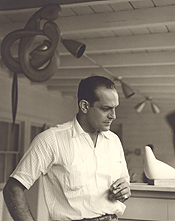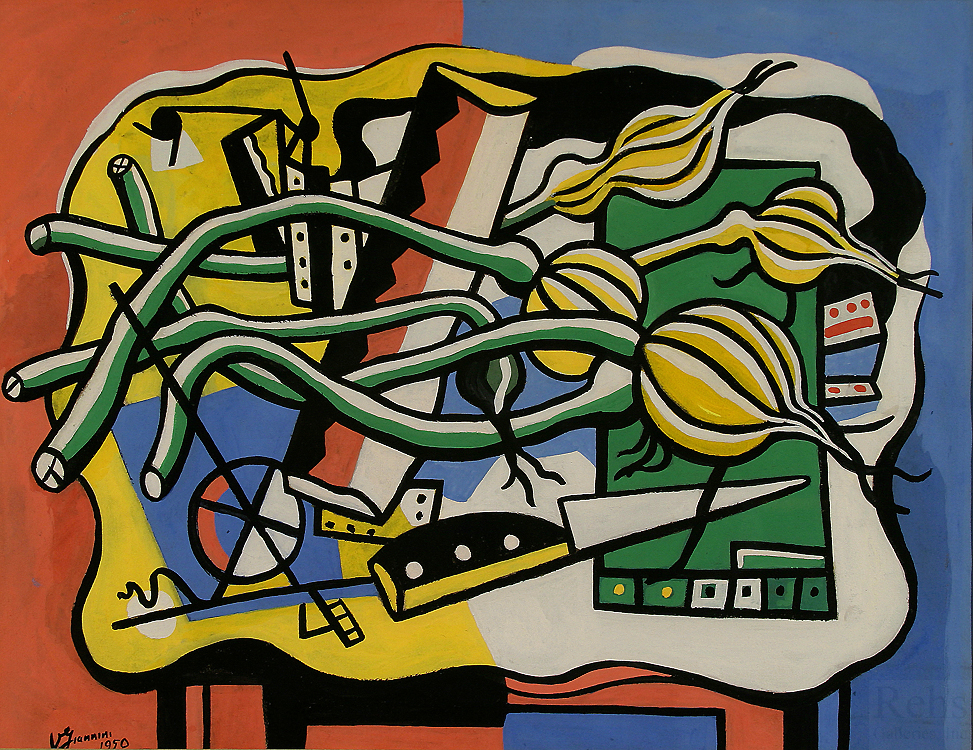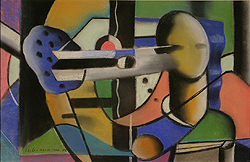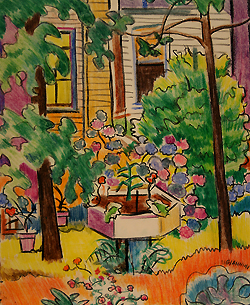Ugo Giannini
(1919 - 1993)
Still Life with Onions
Gouache on paper
16 1/4 x 21 inches
Framed dimensions:
19 1/2 x 24 1/2 inches
Signed and dated 1950
BIOGRAPHY - Ugo Giannini (1919 - 1993)

Born in Newark, New Jersey, in 1919, Ugo Hamlet Giannini was the son of an opera singer and a tailor. After graduating from high school, he enrolled as a student in the Newark School of Fine and Industrial Arts.1 Founded in 1882 as the Fawcett Art School, it was one of the outstanding art schools in America in the middle decades of the twentieth century. He later went on to study at the National Academy of Design in New York.
World War II interrupted his art studies. In 1944, he participated in the Normandy invasion and was among the first wave of soldiers to land on Omaha Beach shortly after H-Hour on D-Day. It was a harrowing experience that would crowd his memory all his life, though he would hardly talk about it. Indeed, it was not until after his death that his heirs found a series of drawings that the young art student, then planning to become an illustrator, had made on the spot, apparently within days or even hours of the invasion. Done in pencil or pen, in the gritty realist style that he had been taught at the Newark School, these drawings show heavily burdened infantrymen trying to stay afloat in the seawater, crawling up a dune, or dead among the ruins of a bombed-out village.
On his return from Europe, where he served until the end of the war, he continued his studies at the Art Students League in New York. But in 1949, at age thirty, he decided to return to Europe to study in Paris with Fernand Léger. Léger, at the time had a large international following of students, both male and female.2 It must have been a fascinating group that included Nadia Grabowska, Léger’s future wife, Jean-Pierre Schecroun, who was to become a major forger of Léger’s work, and Pierre Faniest, who like Giannini had served in the war, and had been severely wounded. Faniest was to become a close friend of Léger, as is evidenced by his recently published memoirs, Léger, Nadia, et moi.3
The year Giannini spent in Paris was to be of decisive importance for his career. Exposed to the major modernist currents of the first half of the twentieth century, most notably Expressionism, Cubism, and Surrealism, he abandoned the realist style in which he had been working until then, becoming increasingly interested in formal issues. The year in Paris thus turned into a fertile period of experimentation during which he produced works that give evidence of a broad variety of artistic influences but nonetheless show great integrity and originality. Indeed, even though they contains hints of Matisse, Picasso, and Léger, such works as In My Father’s Garden of ca. 1949-50, Composition with Bust, dated 1950, and Garden Inscape of ca. 1951 all are the products of a mature and confident artist, who did not slavishly copy the European masters he admired, but absorbed what he found interesting in their works and made it his own.
When Giannini returned to America in 1950, he took a studio on Park Avenue in East Orange, New Jersey. There he continued to experiment with colors and forms in a series of completely non-objective works that he referred to as Contrasting Forms. Unlike the works he had produced in Paris, these paintings no longer make any reference to perceived reality. For the artist, however, they formed a new kind of reality. Or, as he wrote in an undated essay, probably written around this time: “Subject matter is mere appearance. Painting … is the art of discerning and manipulating the structures and processes of seeing. … Reality for me is what I experience by working with forms and colors."4
In 1955, Giannini married Maxine Yellin, a classical pianist, and eventually secured a teaching position at Caldwell College, a Catholic women’s college in New Jersey. More interested in creating and teaching than in promoting his career, Giannini lived a quiet life in West Orange, together with his wife and two children. Working steadily, he produced an impressive oeuvre in a variety of media—painting, gouache, pastel, drawing, and collage. Most of his later works are non-objective, though on occasion recognizable elements re-appear in his work.
As he approached retirement, Giannini felt a need to return to Normandy to revisit the battlefield of his youth. His trip was cut short in Paris by the disease that eventually would fell him but the resurgent memories of Normandy materialized in a series of elegiac works in which his lifelong, silent preoccupation with the war was powerfully condensed. Paintings like Agony at Vierville, Metal Cross for Sgt X, and Hinge Crucifix are abstract works composed of simple symbolic forms that hint at the war’s horrors, particularly as Giannini himself had experienced them. Metal Cross of Sgt X, for example, shows a series of fragmented forms—crosses, arrows, military insignia, a helmet—floating on a dark background. The painting makes a powerful statement about the complete disintegration, both physical and spiritual, caused by war.
Upon the artist’s death in 1993, his heirs found in his modest studio a large and impressive body of works, one more beautiful than the other. Giannini had quietly produced them over the years and had neatly stored them away for posterity to discover.
Petra ten-Doesschate Chu, 2006
1 - Much of the information about Giannini’s life is obtained from his widow Maxine Yellin-Giannini.
2 - Between July 19 and August 5, the Galerie Mai, at 12 rue Bonaparte in Paris, organized an exhibition of works by the students of Léger. The list of exhibitors includes forty-four names, including seventeen women.
3 - Editions de Bergier, 2002.
4 - Handwritten note, in the collection of the artist’s widow.
| AVAILABLE WORKS | |||



